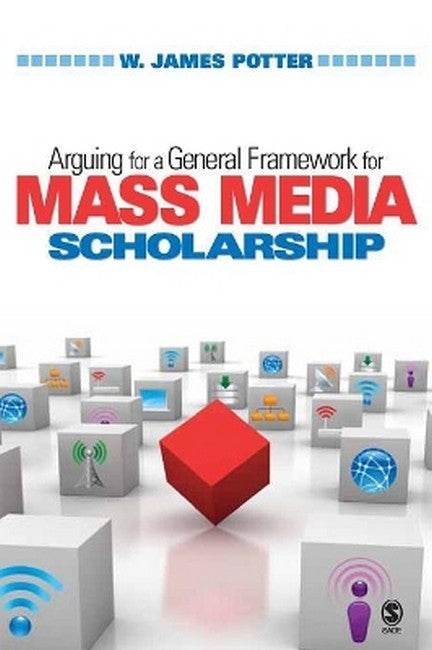This book will play an important role in providing structure to a broad, fragmented discipline. I believe it will, at the very least, create important dialogues about what we now know//understand about areas of mass media, and where we should move as a discipline.a[Thisabook will]ahelp orient future scholars about the imperative to organize our re search more efficiently so that we can expand our knowledge about media phenomena. a Dr. Potter is an excellent writer, able to distill important ideas in a compelling, yet en gaging way. His passion about the topic clearly shines through and this is a major rea son why I believe scholars (and future scholars) will gravitate toward this book.oa --Roger Cooper, Ohio UniversityIn Arguing for a General Framework for Mass Media Scholarship, media scholar and bestselling author W. James Potter challenges media scholars and students to change the way they think about the media.a His goals are to: (1) take a macro approach and focus on explanations that span across four major facets of the mass media: (2) present a critical analysis of the mass media literatures and offer a recalibration of what we know about the media; anda(3) provide structure to mass media scholarship that is focused on the most useful ideas in the phenomenon of the mass media, not lines of research.The arguments and findings in the book are based on sound, in-depth research and analysis. The book presents scholars with an innovative way of thinking about the mass media. It challenges many of their assumptions and practices: Some scholars will find this very stimulating and will learn a great deal by working through the arguments presented in the book; other scholars will likely find themselves arguing against some of Potter's positions u but in so doing, they will be examining their own assumptions to a much deeper level and thereby be stimulated by the experience of reading the book.KEY FEATURES &BAD:amp; BENEFITS**The book is respectful of the wide range of theories and methodologies. Potter does not take an approach that sanctions one world view, method, or theory over others. All are important and useful. However, we need to integrate the value of all approaches instead of arguing over differences. On first reading, his arguments might appear as subversive with so many challenges to past thinking and practices; however,ahe takes a constructive approach: not solely criticizing faulty practices, but providing detailed recommendations about alternative assumptions, re-conceptualizations, and alterations in research practices.**The book is more interested in the future than in the past. It is not just a review of the literatures. It identifies shortcomings and proposes strategies for overcoming them. It presents an innovative plan for moving beyond the base of scholarship produced in the last century and into a new generation of thinking that will provide even more useful explanations for the next millennium.** Most explanations of the mass media focus on only one sub-topic of the overall phenomenon u such as one effect, one type of content, one issue of audience construction, or one type of channel. This book takes a macro approach and focuses on explanations that span across all four major facets of the mass media u the organizations, the content, the audiences, and the effects. ** The few treatments of the mass media that exist are general in nature and are very descriptive, that is, they present thumbnail descriptions of one theory after another, or one research finding after another.a This book presents a critical analyses of the mass media literatures. It presents arguments why certain parts of those literatures u while fairly large u have not produced much value for the field, while other writings u often overlooked or discounted u contain powerful ideas that can be fashioned into elegant explanations about some persistently puzzling aspects of the mass media. This critical analysis results in a re-calibration of what we know about the media.** This re-calibration of important findings along with some creative speculations are synthesized into a fresh approach to explaining the mass media.**The book is not structured by media channels, theories, world-views, or other typical devices used to organize books on the mass media. Instead, it is structured by a vision of what Potter considers the most important ideas to have been generated by mass media scholarship over the last half century. **The focus is on the mass media phenomenon itself more so than on the contours of the research about the mass media.

